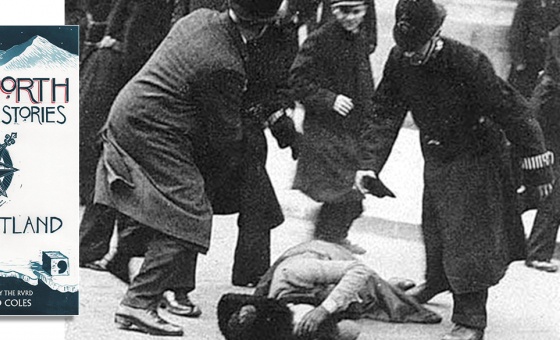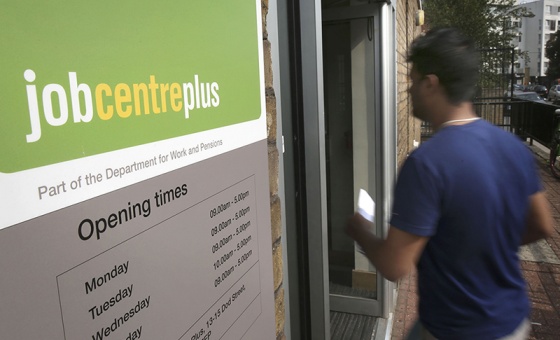This is the last article you can read this month
You can read more article this month
You can read more articles this month
Sorry your limit is up for this month
Reset on:
Please help support the Morning Star by subscribing here
THE political direction of Britain’s labour movement could be decided for many years to come in the course of 2016.
As expected and intended, Jeremy Corbyn’s election as leader of the Labour Party has ignited a battle of ideas and policies not only in the party and the labour movement.
Despite the efforts of the monopoly state and capitalist media to focus on personal and trivial matters, it is spreading into the population at large.
The battle is taking place mainly on two major fronts at present, but is likely to break out on at least two more.
Corbyn’s election campaign was based primarily on his call for Labour to end its support for austerity policies that make workers and their families pay for tax cuts for the rich and big business as public services are prepared for wholesale privatisation.
He led from the front by defying the Labour whips to vote against the Tory government’s Welfare Bill.
His prominent involvement in the People’s Assembly movement against austerity inspired thousands of campaigners and strikers to take part in the ballot to elect an unapologetic socialist as Labour Party leader.
Since then, Corbyn has used his new post to highlight the cruel injustice of tax credit cuts that would further impoverish millions of low-income families.
His appointed shadow chancellor, John McDonnell, another of the rare socialists in the Parliamentary Labour Party, has projected the left and progressive alternative to austerity and privatisation despite rabid hostility to him in the mass media as well inside the PLP itself.
Their determined leadership, backed by a growing section of public opinion thanks to three years of extra-parliamentary campaigning, has united many Labour MPs and helped force Chancellor George Osborne into a number of spectacular U-turns in his Autumn Statement.
Yet the irreconcilables in the PLP continue to snipe and plot, displaying their utter contempt for the 251,417 party members and supporters (59 per cent) who elected him as their leader.
On the second major front — that of military foreign policy — the New Labourites and their allies remain dominant.
They prefer to side with US imperialism rather than pursue an independent foreign and defence policy for Britain based on social justice and solidarity between peoples.
This may suit British oil, armaments and financial corporations and Middle East monarchical dictators, but it has landed the peoples of Britain and overseas in a succession of ruinous, murderous wars that have strengthened the forces of reaction at home and abroad.
Adherence to Nato lines us up with belligerent Islamists in Turkey and inveterate anti-socialists and anti-communists in eastern Europe and the Baltic states.
When Labour’s Commons defence committee member Madeleine Moon justifies the £167 billion renewal of the Trident nuclear weapons system on the grounds that non-nuclear countries around the world treasure our wisdom and integrity in matters of military strategy, even a normally compliant BBC interviewer feels to compelled to splutter: “What, even after Iraq and Libya?”
A massive upsurge of the anti-war movement, led by CND and the Stop the War Coalition, will be needed to stop this madness.
On the basis that the jobs and skills of armaments workers will be turned to civilian and conventional military production, unions should help to ensure that the 2016 Labour Party conference comes out against Trident renewal.
A third front will open up more as the EU referendum draws nearer. Currently, Corbyn and McDonnell are captives of official Labour policy, the shadow cabinet and the PLP.
Yet they know that the EU is a fundamentally anti-working class, anti-democratic set up. Monetarism is enshrined in its fundamental treaties.
The unelected but powerful EU Commission and the unaccountable European Central Bank enforce policies of austerity and privatisation wherever member state governments show the slightest reluctance.
The EU bankers and bureaucrats have sacked elected governments in Italy and Greece, forcing the Syriza administration to privatise almost all state industries and services.
Internationally, the EU seeks to extend the freedom of Europe’s capitalist monopolies to operate anywhere in the world, regardless of trade union rights or national legislation.
Hence the failed attempt to secure the Multilateral Investment Agreement at the World Trade Organisation and today’s secret negotiations for the Transatlantic Trade and Investment Partnership with the US.
While the European Council of heads of government has approved the reform and convergence programmes submitted to it by the British government, its decision of June 15 called for continuing austerity measures, swift introduction of a higher state retirement age, limited mortgage lending to low-income home-buyers and lower business rates and taxes.
Happily, Chancellor George Osborne’s Autumn Statement and spending plans complied fully with EU strictures.
But whereas workers across continental Europe demonstrate their growing awareness of the EU as the reactionary and unreformable creature of big business and the major capitalist states, sections of the trade union movement in Britain continue to harbour all kinds of illusions.
They play up the minor supplementary rights introduced through EU legislation, but forget that 95 per cent and more of our employment, trade union, equal pay, minimum wage and health and safety rights were won by our own efforts.
One of the few reforms granted by the EU — the Posted Workers Directive — has been shredded by rulings from the EU Court of Justice in the Viking, Laval, Ruffert and Luxembourg cases.
These outlaw strike action and uphold the right of foreign-based companies to use migrant labour to undermine pay and employment standards laid down in negotiated agreements and national legislation.
A future left government in Britain must be free to plan the movement of capital, labour and commodities and put an end to exploitation and discrimination.
It should be free to fund infrastructure projects with public-sector bonds bought by the Bank of England — something expressly outlawed by EU treaty.
And while the EU does not forbid public ownership of industries and services such as energy, public transport, banking, armaments, pharmaceuticals and steel, it demands that all nationalised enterprises operate along strictly commercial lines regardless of wider social or environmental concerns.
If socialists in Britain are serious about building a mass movement, winning a left government and advancing towards socialism, they will have to face up to the massive obstacles presented by EU membership — and soon, otherwise even the anti-EU case will be dominated by right-wing arguments as most of big business campaigns to stay in.
The fourth front in the battle of ideas and policies in the labour movement will be that for inner-party democracy.
Labour MPs who represent the interests of British big business, the EU Commission and the US Pentagon cannot expect to have seats for life as cuckoos in the Labour nest.
If Labour policies come to reflect more closely the interests of the working class and people generally, they will either have been won over, or they should quit or, failing either, local Labour Party members should replace them with genuinely Labour candidates.
In the battle on the every front, the Communist Party will lend its support and solidarity with those fighting for progress and socialism. We will do so openly, without entryism or other subterfuge. We will be consistent, unlike those who urged members and unions to abandon the Labour Party yesterday, but who now lecture them about what they should do inside that party today.
Indeed, a much stronger and more influential Communist Party will empower the left across the labour and progressive movements, organised as it is for trade union, extra-parliamentary and ideological struggle as a Marxist-Leninist party.
Together, we can win historic advances in 2016, especially if we heed the words of John McDonnell recently. In calling for the capitalist media monopolies to be broken up, he also urged support for the labour movement’s own media. That must mean, above all, winning more readers for the Morning Star, the daily paper for peace and socialism.
- Robert Griffiths is general secretary of the Communist Party of Britain.









